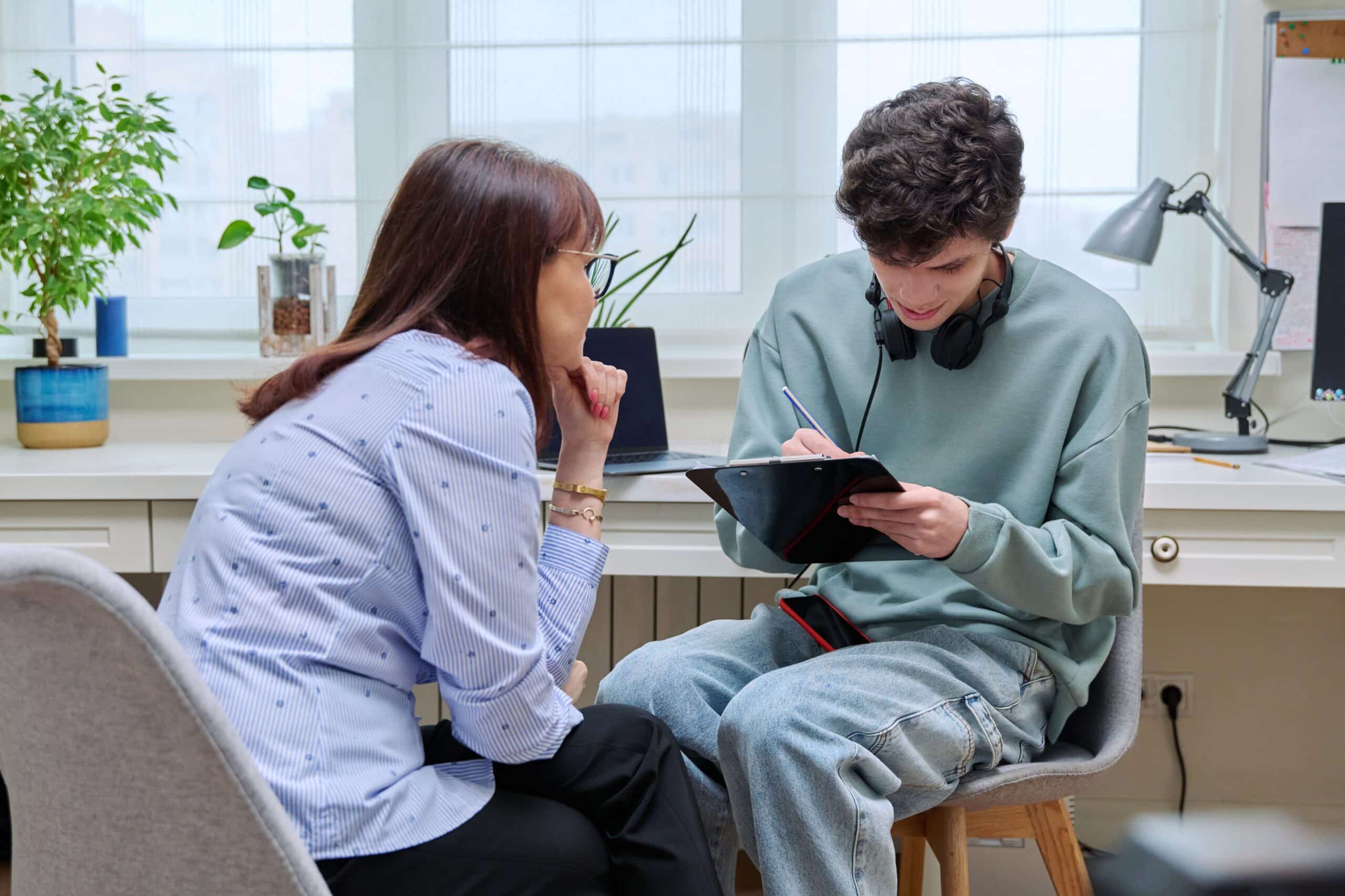Immediate Availability - Open 7 days a week - day, evening and weekend appointments
Immediate Availability - Open 7 days a week - day, evening and weekend appointments
For individuals between the ages of 10 and 19, life is a time of transformation. It’s a season of rapid growth and deep questions. A time when teens are discovering who they are, what matters to them, and how they relate to the world around them.
It can be exhilarating. It can also be confusing, overwhelming, and lonely, especially when life throws them challenges they didn’t ask for and don’t yet have the skills to navigate.
Adolescent counselling supports tweens and teens navigating emotional, social, or behavioural challenges, whether you're the one experiencing them or someone who loves and worries about them. And when the adults around you are under their own stress (parents, we see you too), it can feel even harder to ask for help or to give it.
Unlike child therapy, adolescent counselling respects the growing emotional and cognitive maturity of teens offering both space and support. Whether you’re a teen craving more privacy or a parent seeking guidance, we hold both needs in mind.


Anxiety, Depression, and Stress

Peer Pressure and Risky Behaviour

Identity Exploration and Gender Issues

Academic Struggles and School Avoidance

Low Self-Esteem and Confidence Issues
If your teen seems withdrawn, overly critical of themselves, or constantly comparing their life to others online, you’re not alone. Today’s digital world amplifies insecurity. Between filters, social media perfection, and even AI deepfakes ...

Family Conflict and Communication Breakdowns
Remember when TV families solved everything with a heartfelt talk in 22 minutes? Real life isn’t quite so tidy. These days, communication between teens and parents can feel more like crossed wires than meaningful connections. ...

Social Skills and Friendships
Many teens today are finding it harder to form lasting friendships, not because they don’t want these things, but because they’ve had fewer chances to practice the real-life skills that help relationships grow. ...

Trauma, Grief, or Life Transitions
Some chapters begin before we’re ready.
Divorce. Loss. A big move. A scary diagnosis. These transitions hit hard, and for teens, who are still developing emotional tools, it can feel like the ground has shifted beneath them.
...

Screen Time and Social Media Addiction
Social media can feel like a lifeline and a trap. Teens are under more pressure than ever to stay connected, keep up appearances, and respond 24/7. And behind the screen, their mental health is taking a hit. ...

Adolescent counselling starts with a foundation of trust and respect for both teens and their caregivers.
Therapy with teens looks a little different than it does with adults, and that’s intentional. At One Life, we tailor each session to the teen’s age, personality, and comfort level. Some teens love to talk. Others prefer to start with creative expression or just some quiet space. However you show up, we will meet you there. No pressure, just presence.
Depending on the needs, a session may include:
For older teens, sessions often feel more like supportive coaching, helping them navigate their decisions, roles, and growing sense of self.
Adolescent counselling at One Life offers your teen a calm, non-judgmental space to be themselves, process what they’re going through, and build the skills they need to face life with clarity and confidence. Sometimes, that healing happens through deep conversations. Sometimes, it begins with simply being listened to, without pressure to be anything other than who they are.
Research consistently shows that the quality of the therapeutic relationship is the strongest predictor of positive outcomes in counselling, especially for adolescents.
That’s why we place so much emphasis on trust, connection, and fit. If your teen doesn’t feel at ease with their therapist, that’s okay, and it doesn’t mean therapy “isn’t for them.” We’re happy to support a switch to a new therapist who might be a better match. Our priority is connection, not just convenience. If the fit isn’t right, we’ll help you find someone who is.


While we always prioritize teen confidentiality, we also know you’re an essential part of their support system. Here’s how we stay connected:
We’re here for the whole picture, supporting your teen and you, too, in ways that feel respectful, collaborative, and real.

Cognitive Behavioural Therapy (CBT)
Helps teens identify and shift unhelpful thought patterns to improve mood and behaviour, building practical skills for managing anxiety and stress.

Dialectical Behaviour Therapy (DBT)
Teaches emotional regulation and distress tolerance, supporting teens in navigating intense feelings and improving relationships.

Emotion-Focused Therapy (EFT)
Encourages teens to explore and express their emotions safely, fostering deeper self-awareness and healing.

Narrative Therapy
Helps teens reframe their personal stories, empowering them to separate from negative experiences and create a more hopeful identity.

Mindfulness-Based Stress Reduction (MBSR)
Cultivates present-moment awareness, reducing anxiety and increasing resilience through gentle mindfulness practices.

Supports teens in understanding and healing their inner “parts” or subpersonalities, fostering self-compassion and helping them navigate internal conflicts for greater emotional balance.


Recognizing the signs early can make a big difference. If you're seeing these signs in your teen, or if you’re a teen noticing these things in yourself, it might be time to reach out. Our Calgary psychologists can provide the support and guidance you need.
Life’s full—for teens and parents alike. That’s why we offer flexible therapy options to support everyone involved.

Convincing a teen to go to therapy often requires patience, empathy, and a thoughtful approach. Teens are in a stage of life where autonomy matters deeply, so how you bring up the idea of counselling can significantly impact their openness to it.
Start by normalizing therapy as a strength, not a sign that something is “wrong.” Reassure them that therapy is a place to learn about themselves, build coping tools, and talk about things they may not want to share with family or friends. Be clear that you’re coming from a place of care, not criticism, and offer therapy as a choice, not an ultimatum.
It’s also helpful to validate their hesitation and let them know it’s okay to feel unsure. Sometimes just leaving the door open without pressure makes all the difference. And if you are able to, let them know that you’ll take care of the cost; teens often worry about finances more than they let on.
Still unsure how to approach the conversation?
We’ve put together a detailed guide with scripts and supportive suggestions to help you navigate this moment.
Read the full blog: How Do I Convince My Teen to Go to Therapy?
You’ll learn how to open the door gently, keep trust intact, and set your teen up to feel safe—not pressured—when they’re ready to take that step.
If being able to use your insurance benefits is an important factor in your selection, our team would be happy to recommend one of our therapists who's services are covered by most insurance plans. Please be sure to confirm in advance if insurance coverage is preferred.
Our standard fees are aligned with the recommended fee schedule from the Psychologists' Association of Alberta’s recommended schedule. However, we offer the added value of 60-minute sessions in contrast to the recommended 50-minute session for this fee.
"*" indicates required fields